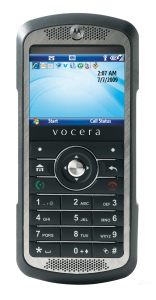 Vocera Communications, maker of wireless communications systems for healthcare, has filed for an initial public offering worth as much as $80 million. The filing is dated Aug. 1, before completion of the federal debt-reduction agreement that has sent the stock market into a tailspin.
Vocera Communications, maker of wireless communications systems for healthcare, has filed for an initial public offering worth as much as $80 million. The filing is dated Aug. 1, before completion of the federal debt-reduction agreement that has sent the stock market into a tailspin.
The company, which expects to trade on the New York Stock Exchange under the ticker symbol VCRA, has not indicated the timing of its IPO, nor has it specified a price range for its shares. "We expect to use the net proceeds from this offering for general corporate purposes, including repayment in full of outstanding borrowings under our credit facility and working capital. We may also use a portion of the net proceeds to acquire or invest in complementary businesses, technologies or assets," Vocera says.
According to the filing, San Jose, Calif., Vocera posted its first annual profit in 2010, earning a net $1.2 million on $56.8 million in revenues. Revenue was up 38.1 percent from $41.1 million in 2009. That year, Vocera lost $992,000.
Strong sales growth has continued in 2011, but expenses have piled up. For the first half of the year, the company reported revenues of $37.4 million, an increase of 45.9 percent from the $25.6 million in revenues during the same period a year earlier. However, Vocera lost more than $1.3 million in the first six months of 2011, after earning $2.2 million during the first half of last year.
"We expect our expenses to increase due to the hiring of additional personnel and the additional operational and reporting costs associated with being a public company," Vocera says in the filing.
Vocera generates about 98 percent of its sales from its voice communications products, but recently added messaging with its December 2010 acquisition of Wallace Wireless and consulting services by purchasing ExperiaHealth last November. Similarly, 98 percent of the company's business comes from healthcare, though there has been an effort of late to target mobile workers in the retail, library and hospitality industries.















